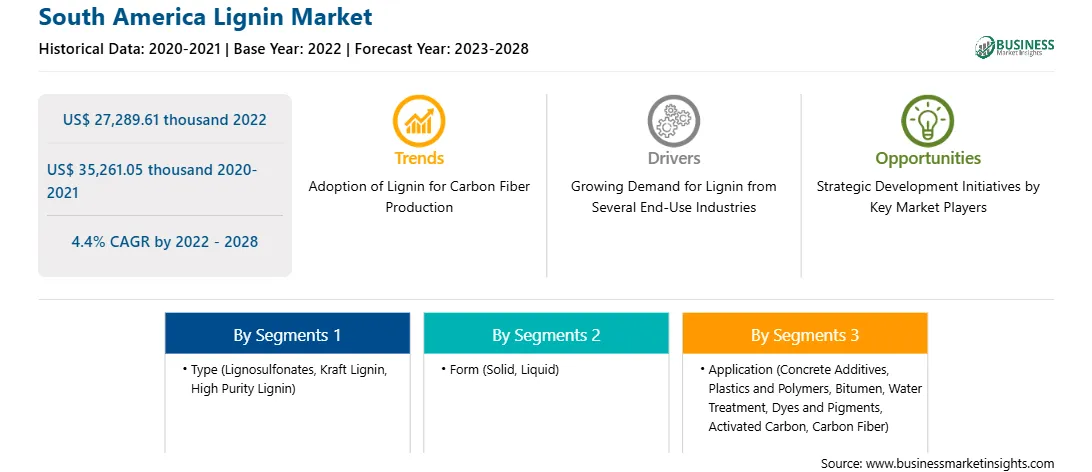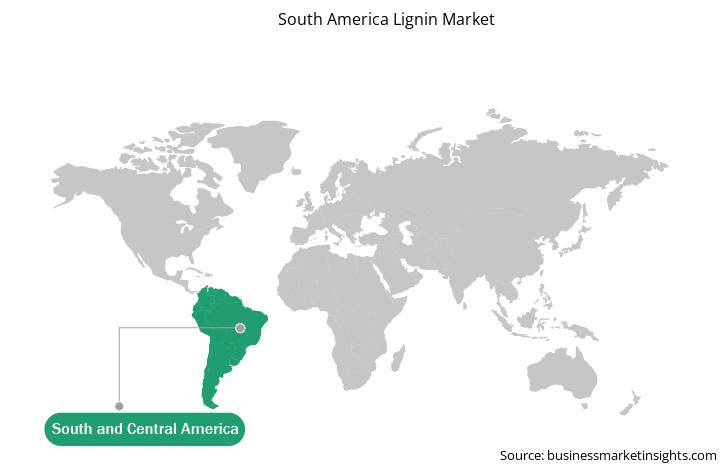Lignin manufacturers are investing significantly in strategic development initiatives such as product innovation, mergers & acquisitions, and expansion of their businesses to attract a wide customer base and enhance their market position. Moreover, the demand for lignin is increasing among end-use industries due to rising environmental concerns and sustainability issues. For instance, in December 2021, Nippon Paper (Japan) and Stora Enso Oyj (Finland) signed a partnership agreement to use trees to revolutionize the battery industry. Their research focused on the replacement of lithium-ion and rare-metal batteries with lignin. Such product innovations help companies to gain a competitive advantage in international markets.
Major manufacturers are adopting creative strategies such as acquisition, expansion, and production capacity scaleup to serve their customers better and satisfy their growing demands. Therefore, strategic initiatives by manufacturers are expected to fuel the growth of the lignin market during the forecast period.
The presence of the pulp & paper industry has been increasing in South America owing to the rising production and export of pulp and paper. In 2020, Brazil led the world ranking for exporting more than 15 million tons of pulp, making it a major global input supplier. Lignin is predominantly sourced from pulp & paper mills and cellulosic biorefineries. Lignin is being used in commercial polymers to improve biodegradability, as it is cost effective and a non-polluting biodegradable polymer. To mitigate the growing demand for pulp and paper across the region, many manufacturers of bio-based materials have been taking initiatives and focusing on expanding their production capacity. For instance, on May 12, 2021, Suzano SA, a eucalyptus pulp producer in South America, announced the construction of a new US$ 2.8 billion pulp plant project in Brazil with an annual production capacity of 2.3 million tons. These expansion projects by the manufacturers contribute to the high productivity of pulp and paper across the region, which bolster the growth of the lignin market.
Strategic insights for the South America Lignin provides data-driven analysis of the industry landscape, including current trends, key players, and regional nuances. These insights offer actionable recommendations, enabling readers to differentiate themselves from competitors by identifying untapped segments or developing unique value propositions. Leveraging data analytics, these insights help industry players anticipate the market shifts, whether investors, manufacturers, or other stakeholders. A future-oriented perspective is essential, helping stakeholders anticipate market shifts and position themselves for long-term success in this dynamic region. Ultimately, effective strategic insights empower readers to make informed decisions that drive profitability and achieve their business objectives within the market. The geographic scope of the South America Lignin refers to the specific areas in which a business operates and competes. Understanding local distinctions, such as diverse consumer preferences (e.g., demand for specific plug types or battery backup durations), varying economic conditions, and regulatory environments, is crucial for tailoring strategies to specific markets. Businesses can expand their reach by identifying underserved areas or adapting their offerings to meet local demands. A clear market focus allows for more effective resource allocation, targeted marketing campaigns, and better positioning against local competitors, ultimately driving growth in those targeted areas.South America Lignin Strategic Insights

South America Lignin Report Scope
Report Attribute
Details
Market size in 2022
US$ 27,289.61 thousand
Market Size by 2028
US$ 35,261.05 thousand
Global CAGR (2022 - 2028)
4.4%
Historical Data
2020-2021
Forecast period
2023-2028
Segments Covered
By Type
By Form
By Application
Regions and Countries Covered
South and Central America
Market leaders and key company profiles
South America Lignin Regional Insights

South America Lignin Market Segmentation
The South America lignin market is segmented based on type, form, application, and country. Based on type, the South America lignin market is segmented into lignosulfonates, kraft lignin, high purity lignin, and others. The lignosulfonates segment held the largest South America lignin market share in 2022.
Based on form, the South America lignin market is bifurcated into solid and liquid. The solid segment held a larger market share in 2022.
Based on application, the South America lignin market is segmented into concrete additives, plastics and polymers, bitumen, water treatment, dyes and pigments, activated carbon, carbon fiber, and others. The others segment held the largest market share in 2022.
Based on country, the South America lignin market is segmented into Brazil, Argentina, and the Rest of South America. Brazil dominated the South America lignin market share in 2022.
Nippon Paper Industries Co Ltd; Borregaard ASA; Burgo Group SpA; Domsjo Fabriker AB; Sappi Ltd; Stora Enso Oyj; Suzano SA; and The Dallas Group of America Inc are the leading companies operating in the South America lignin market.
The South America Lignin Market is valued at US$ 27,289.61 thousand in 2022, it is projected to reach US$ 35,261.05 thousand by 2028.
As per our report South America Lignin Market, the market size is valued at US$ 27,289.61 thousand in 2022, projecting it to reach US$ 35,261.05 thousand by 2028. This translates to a CAGR of approximately 4.4% during the forecast period.
The South America Lignin Market report typically cover these key segments-
The historic period, base year, and forecast period can vary slightly depending on the specific market research report. However, for the South America Lignin Market report:
The South America Lignin Market is populated by several key players, each contributing to its growth and innovation. Some of the major players include:
The South America Lignin Market report is valuable for diverse stakeholders, including:
Essentially, anyone involved in or considering involvement in the South America Lignin Market value chain can benefit from the information contained in a comprehensive market report.